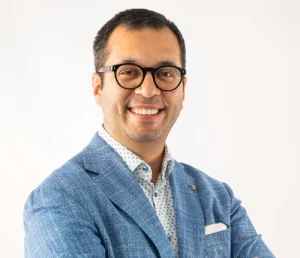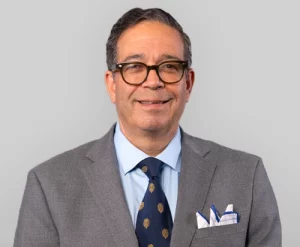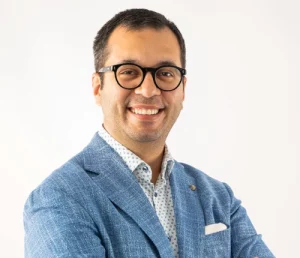Improving the physical and mental health of young cancer survivors through fitness
Dr. Ramy Saleh is a physician and researcher who wears many hats: staff medical oncologist at the Cedars Cancer Centre at the McGill University Health Centre (MUHC); Medical Director of oncology clinical trials at the Research Institute of the MUHC (RI-MUHC); Medical Director of the Phase I Research Unit at the CIM Centre of the R-MUHC; Assistant Professor at McGill’s Faculty of Medicine and Health Sciences; Co-Founder of the Sarcoma Research Consortium of Quebec (SaRC-Q); and Co-Director of the Jackie Aziz Adolescent and Young Adult Program at Cedars – to name a few. He specializes in prostate cancer, bladder cancer, and kidney cancer, as well as in sarcomas, and he is passionate about medical innovation.

Dr. Ramy Saleh is a physician and researcher who specializes in prostate cancer, bladder cancer, and kidney cancer, as well as in sarcomas, and is passionate about medical innovation
Dr. Saleh is also an active advocate for better treatments and support for adolescent and young adult cancer patients, who are often referred to as AYAs.
So, when he heard the results of a study that demonstrated significantly better outcomes for colon cancer patients who had followed a structured, post-treatment exercise program, he knew he wanted to implement something similar for AYA patients at the Cedars Cancer Centre.
The international CHALLENGE study was conducted between 2009 and 2023. It involved 889 patients from six countries, all of whom had been treated for advanced colon cancer, and who had a median age of 61. Half of the patients were randomly assigned to participate in a structured exercise program, with a trainer, while the other half received health education materials promoting physical activity and healthy nutrition. The results were astonishing. The patients who took part in a structured exercise program with a trainer had:
Better physical fitness;
A 28% lower risk of recurrent or new cancers than those in the health education program;
Overall survival of 90% after 8 years, compared to 83% for those in the health education program.
“It was a remarkable study. I was blown away by the data. It clearly demonstrated that participating in a fitness program that includes a personal trainer reduces the risk of cancer reoccurring, makes patients feel fitter and stronger, and helps them live longer,” says Dr. Saleh. “And I thought: why not do a similar study with AYA patients here at the MUHC?”
As Co-Director of the Jackie Aziz AYA Program at Cedars, and as the oncologist of many AYA patients himself, Dr. Saleh says he could clearly see the potential psychological and social benefits of a post-treatment exercise program for young cancer patients. “Chemotherapy is really hard on the body. It can make you lose your hair, lose muscle mass, and gain a lot of weight. Many of my patients are shy about it, so they isolate themselves. I wanted to encourage them to start reintegrating themselves by creating an experience that would be fun – and beneficial to their health and wellbeing.”

Jeff J. Shamie, President and CEO of Cedars notes that Cedars is proud to finance initiatives that support patients beyond their treatment and that help them get their lives back
The first step was finding the right gym and fitness trainer, at the right price. After approaching various gyms in the vicinity of the Cedars Cancer Centre, he came upon Nico Vlachos, CEO of Big Daddy Fitness Gym, who was very enthusiastic about the study and offered a big discount.
“I’ve trained a lot of people, and have over 22 years of experience, but nothing compares to working with cancer survivors,” says Nico. “Every push, every stretch, every step forward feels like a victory. Helping them rebuild their strength and hope is the greatest honour. A close friend of mine was impacted by cancer, and this is another way that I can give my help and my energy to the people who need it.”
And so was born the LIFT-AYA Study: Lifestyle Intervention with Fitness Training in Supportive Care for Adolescents and Young Adults with Cancer.
The study seeks to determine if patients experience significant improvements in physical and mental health after following a supervised, tailored fitness program for a three-month period. The goal is to improve health-related quality of life by reducing fatigue, enhancing physical strength, and supporting psychological wellbeing. The study also looks at feasibility, adherence, and if/how such an intervention can be realistically integrated into cancer care.
“It’s the only study of its kind in Montréal right now, and it’s unique,” Dr. Saleh proudly explains. “Most clinical trials in oncology focus on the effectiveness of medications on cancers, while this one focuses on the effectiveness of a behaviour on physical and emotional health. It’s not targeting cancer; it’s targeting wellbeing and rehabilitation.”
The LIFT-AYA Study is open to MUHC cancer patients who have just finished chemotherapy, and who are ideally younger than 50. Patients undergo blood tests and complete a mental health self-assessment prior to starting the fitness program. Next, Nico designs a program for each patient, in collaboration with the healthcare team, and he provides a one-on-one evaluation and training session every couple of weeks. At the end of every month, patients have another round of blood tests and once again fill-in the mental health self-assessment.
“It’s a beautiful, modern gym, and Nico offers every patient a free membership for three months. They can go as many times as they like, but we ask them to go at least eight times, as a part of the study,” explains Dr. Saleh. “And, if they do, they’ll get a free massage, as a reward!”
At the moment, there are two young patients in their 20s enrolled in the study, which just recently got the green light. Dr. Saleh and his team are hoping to enlist at least 50 participants over the next two years. If the results are conclusive, and with the continued support of philanthropic organizations like the Cedars Cancer Foundation, Dr. Saleh hopes that this type of post-treatment rehabilitation will become a standard part of the supportive care offered to cancer patients at the MUHC.
“Cancer patients need more than just medical care. They need services and treatments that relieve physical and emotional suffering and that help improve their quality of life and wellbeing, at all stages of their cancer journey,” says Jeff J. Shamie, President and CEO of Cedars. “We’re incredibly proud to finance initiatives like this that support patients beyond their treatment and that help them get their lives back.”
To learn more about the Cedars Cancer Foundation and the programs it supports, go to cedarscancer.ca.

